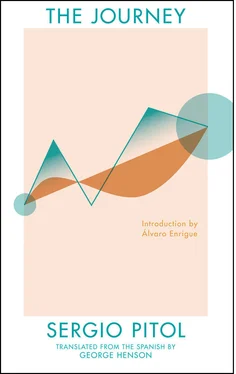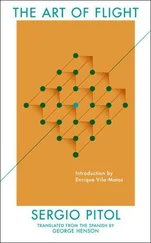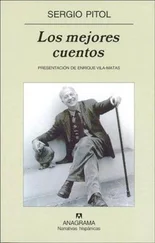Sergio Pitol - The Journey
Здесь есть возможность читать онлайн «Sergio Pitol - The Journey» весь текст электронной книги совершенно бесплатно (целиком полную версию без сокращений). В некоторых случаях можно слушать аудио, скачать через торрент в формате fb2 и присутствует краткое содержание. Год выпуска: 2015, Издательство: Deep Vellum Publishing, Жанр: Современная проза, на английском языке. Описание произведения, (предисловие) а так же отзывы посетителей доступны на портале библиотеки ЛибКат.
- Название:The Journey
- Автор:
- Издательство:Deep Vellum Publishing
- Жанр:
- Год:2015
- ISBN:нет данных
- Рейтинг книги:5 / 5. Голосов: 1
-
Избранное:Добавить в избранное
- Отзывы:
-
Ваша оценка:
- 100
- 1
- 2
- 3
- 4
- 5
The Journey: краткое содержание, описание и аннотация
Предлагаем к чтению аннотацию, описание, краткое содержание или предисловие (зависит от того, что написал сам автор книги «The Journey»). Если вы не нашли необходимую информацию о книге — напишите в комментариях, мы постараемся отыскать её.
The Journey This adventurous story, based on the author's own travel journals, parades through some of the territories that the author lived in and traveled through (Prague, the Caucasus, Moscow, Leningrad) as he reflects on the impact of Russia's sacred literary pantheon in his life and the power that literature holds over us all.
The Journey
The Journey — читать онлайн бесплатно полную книгу (весь текст) целиком
Ниже представлен текст книги, разбитый по страницам. Система сохранения места последней прочитанной страницы, позволяет с удобством читать онлайн бесплатно книгу «The Journey», без необходимости каждый раз заново искать на чём Вы остановились. Поставьте закладку, и сможете в любой момент перейти на страницу, на которой закончили чтение.
Интервал:
Закладка:
FAMILY PORTRAIT I
Ah, how far translated by now, how abstracted,
Marina, are we even at heartmost pretext.
Signal givers, no more.5
RAINER MARIA RILKEI’ve spent the last few months reading Marina Tsvetaeva. Among my Russian books I have editions from Moscow from 1979 and 1984; all of the Spanish translations, owed to the passion of Selma Ancira; the Italian ones prefaced by Serena Vitale; her poetry in French; and a large volume of English prose with an introduction by Susan Sontag; as well as the biographies by Anastasia Tsvetaeva, her sister; Simon Karlinsky; and Veronique Lossky. I began to acquire them several years ago; however, I had only read fragments, without any continuity. I became familiar with her name during the years of the Thaw, the period that followed the revelation of Stalin’s crimes. Ehrenburg in his memoirs underlines her importance in Russian poetry and becomes her shadow council, like those of Mandelstam and Babel, to republish her works and exhibit them to a generation that knew nothing of her journey through life and of the splendor they introduced into the language. During my stay in Moscow I was present at endless meetings where there was always someone debating until late into the night the enigmas her life and family attracted. Whether it was true that in her final days in Moscow, during her years as an exile, an outcast, she had met with Anna Akhmatova, and if so, what happened during those visits, what they talked about, in what tone, with what results. Some said that during a long walk through the woods, on a winter afternoon, wrapped in woolen shawls, Akhmatova recited from memory her Requiem , while Marina moved her lips and hands pretending to be talking, or arguing about something, to confuse professional witnesses. Others argued that those evenings meant nothing, that Akhmatova feared Tsvetaeva, that she was aware of her harsh temperament, her arrogant recklessness, so the only two times they met, she stayed on the defensive, treated her politely, because she was a true lady, and also with compassion because of her tragedy, because her heart was immense, and so everyone gave different but always complimentary versions for Akhmatova, a woman beloved by all, and swore that they came from absolutely reliable people: the doctor of one of them, or a friend of Anastasia, Tsvetaeva’s sister, with whom she shared her house, or a teacher who knew them both, and could spend whole nights listing the loves that Tsvetaeva was known to have had, and how disastrous she could be in that regard, a pest, a pain, because of the persecution to which she subjected beautiful young men who admired her as a writer or for her unique personality, for everything genuine there was in her, but could not and would not respond to her demands because they had a different sexuality that placed them in impossible situations. And they could go on about this topic to infinity because some of my friends were students of theater and had been students, and somehow also friends, of those who half a century before had been the ephebes who were targets of the excessive libido of that intrepid Amazon. And if one spoke of the Efron family, of Marina, of her husband Sergei, of Ariadna, the daughter who had just died around that time (when I worked in Moscow), of Mur, the son, it was a never-ending event. One of the biggest mysteries that surely no longer is, since one can check the archives of the KGB, is why, if Sergei Efron, her husband, was an important agent of Soviet espionage, as some say, he always lived with his family in a poverty that teetered on beggary. I had read poems in anthologies of Russian poetry, a story or two and many articles about her. At the insistence of Selma Ancira, I began to read the great poetess this year; I began with the press proofs of a 1929 book on the painter Natalia Goncharova, whom she had just translated, and I have continued reading her to this day.
The next book in my reading marathon was A Captive Spirit , recently published by Galaxia Gutenberg, in Barcelona. The most important essay in the book is a splendid portrait of Andrei Bely, written in 1934 when she learned of the death of the celebrated author of Petersburg . Tsvetaeva’s writing in the thirties attained a remarkable distinction and her prose was absolutely original; every essay from her pen becomes a search for one’s self and its surroundings, which in itself is not new, but the formal treatment, the certain and bold narrative strategy is. She invents a different discursive construction. In her writing of this period, the thirties, always autobiographical, everything dissolves into everything, the minuscule, the jocose, the digression on the task, on what is seen, lived, and dreamt, and she recounts it with unexpected rhythm, not without a certain delirium, an alacrity, which allows the writing itself to become its own structure, its reason for being.
A Captive Spirit is the perfect example of this type of essay that she wrote during her final years; it consists of the creation of an atmosphere — incomplete portraits — she is not interested in creating biographies — few details, more or less tics, eccentricities, digressions on writing, her surroundings, fragments of conversations, a sense of montage as effective as Eisenstein; nothing seems important, but everything is literature. The friendship between Bely and Tsvetaeva was brief, a few months, no more than two or three, in the dynamic Berlin of 1922, while Marina awaits her husband whom she has not seen in seven years, who is to come for her and take her to Prague where he is studying philology at the Charles University. Bely implored her to get a room near his, because Berlin depressed him, he feared dying, it brought him bad memories at all hours, his wife had run off with someone disgraceful, he said, she had left him forever, and he did not dare return to Moscow, since before leaving he had burned all bridges forever, so a return could be dangerous, fatal. Tsvetaeva got the room, but he did not receive her letter because in his desperation he had returned to Russia, whence he never left. Tsvetaeva was infuriated by this false step, without realizing that she would do the same, in worse circumstance and, of course, with fatal results.
The Tsvetaeva editions, as well as her biographies, are illustrated with photographs of the writer and the other dramatis personae who surround her. To see the faces of the characters in this tragedy, throughout the temporal circumstances, means reading a much deeper writing. The first photo that appears in A Captive Spirit is the one I prefer; it is of an elegant couple, with an inner harmony that illuminates the figures and landscape. The characters are sitting on the grass in a forest possibly near Moscow. It appears to be well into autumn or the soft start of winter. They are wearing heavy coats, woolen scarves, and head coverings. At that moment it is evident that they are happy; this can be seen in every inch of the photo, certainly because they are together in that beautiful forest, I imagine, and, above all, because they have reunited once again in their home country, which they had abandoned many years ago. They are father and daughter, Sergei and Ariadna Efron, the husband and daughter of Marina Tsvetaeva. The date of the photo is 1937, when the daughter decided to return to Moscow to work at a news agency, and also the year in which Efron arrived, months later, fleeing the French police that believed him to be involved in a political crime. Not a shadow of care can be seen in the photo that brims with happiness: a sheer idyll. There was even less of a glimpse of the tragedy that was soon to rain down on them. During the moments of that happiness, Marina Tsvetaeva and Mur, her young son, remain in France in desperate economic conditions, friendless, homeless, surrounded by a general hostility. Two years pass and the family finally reunites in a village just outside Moscow. Two months later, Ariadna is arrested and later sentenced to eight years of hard labor in Siberia; a few days later Sergei Efron suffers the same fate, but his sentence is harsher: capital punishment. The family’s pro-Marxist element disappears unexpectedly, and not in enemy space, but in what is supposedly their own. In contrast to Marina, the aristocrat, who has written elegiac poems to the White Guardsmen, who is planning a collection of poems in which she will sing the greatness of the tsar’s family, the enemy of the Bolsheviks, escapes unscathed; but she is unprotected in Moscow, with appalling economic difficulties, in a world of terror, where many of her close friends have disappeared, also kidnapped by the political police. The Prince Svyatopolk-Mirsky, her friend, the most subtle historian of Russian literature, the first who praised her abroad and thereby attracted the tribal hatred of Russians in Paris, also returned to the homeland and converted to Marxism, disappeared like her daughter, her husband, and her sister Anastasia, of whose support she was certain. Some other friends are in danger, their homes have been seized, and they cannot help her. She does not understand anything. She assumes, as do all Russian exiles in Paris, that any intellectual who did not openly fight the government possessed special powers in the interior. The World War arrives; the Germans cross Soviet borders. The chaos is immense. Marina and her son move from one small room to another in an increasingly precarious Moscow. Georgy, her beloved Mur, whom she has treated all her life as a mere extension of her body and spirit, rebels: he accuses her of having destroyed his father and sister due to thoughtless attitudes, a lack of tact and arrogance; such that, they would also most certainly be killed soon. This is the harshest blow. That son who had always been wrapped in cellophane not to be touched, not even by air, rebukes what little intuition she has left to survive; he badgers her, makes her responsible for having done everything that should not have been done. Indeed, they do not survive, Tsvetaeva eventually commits suicide in 1941, and Georgy is sent to a boarding school for children of enemy parents of the country, he later joins the army and marches to the front, where, of course, he succumbs, it seems in 1944. Of them only Ariadna survives and endures eight years with unimaginable courage in a concentration camp. In 1948, after completing her sentence, she is released, only to be arrested again months later and sentenced to live for the rest of her life in an atrocious region of northern Siberia, in a climate where the temperature falls to fifty degrees below zero, where she survives another six years, to be rehabilitated on the death of Stalin. In subhuman conditions, Ariadna begins to establish, from a place that does not even exist on maps, contact with relatives and friends of her mother, contemporary writers, publishers, editors, whoever might have knowledge of the whereabouts of her mother’s papers. Before returning to Moscow, Tsvetaeva had deposited in a Swiss literary institution some folders with writings that could endanger the family — political poems in praise of the Whites: The Demesne of the Swans, Perekop , and fragments of one not yet finished: Poem of the Tsar’s Family —writings so intimate that it would be fatal to know that they had been read by enemies’ eyes, a tiny drop in the vast sea of her production. Everything else, everything, it can be said, was scattered throughout the homes of friends, or people who were friends and became enemies, or who refused her access for fear of implicating themselves. After returning from exile, Ariadna dug for clues about writings from Moscow, Berlin, Belgrade, Prague, Paris, and uncovered hard-to-find editions and texts published in magazines and newspapers that had not existed for decades, as well as those unpublished. Thanks to her daughter’s methodical and selfless activity, the body of the work remained complete, except for a few minor pieces. Almost everything recovered has been published. Ariadna, before dying, placed in the custody of a Soviet Institute of Literature various folders that she deemed inconvenient to be made public before the year 2000. This legacy may provide immense surprises. It is possible that some enigmas will be cleared up.
Читать дальшеИнтервал:
Закладка:
Похожие книги на «The Journey»
Представляем Вашему вниманию похожие книги на «The Journey» списком для выбора. Мы отобрали схожую по названию и смыслу литературу в надежде предоставить читателям больше вариантов отыскать новые, интересные, ещё непрочитанные произведения.
Обсуждение, отзывы о книге «The Journey» и просто собственные мнения читателей. Оставьте ваши комментарии, напишите, что Вы думаете о произведении, его смысле или главных героях. Укажите что конкретно понравилось, а что нет, и почему Вы так считаете.












